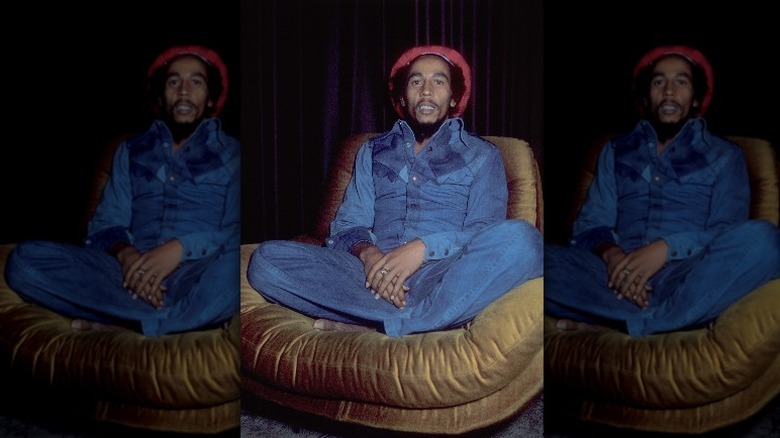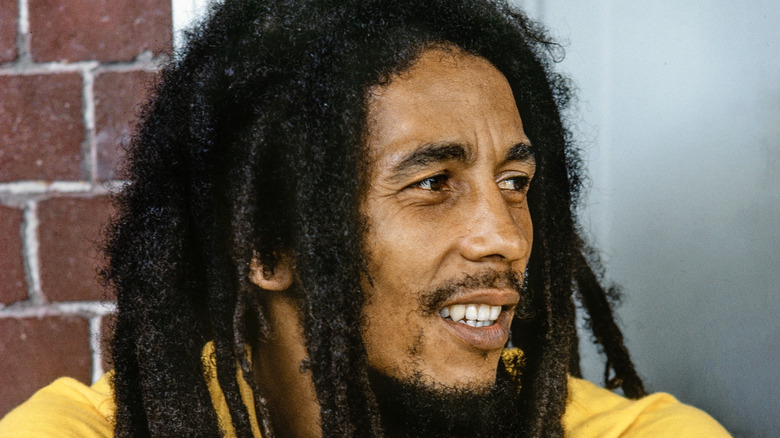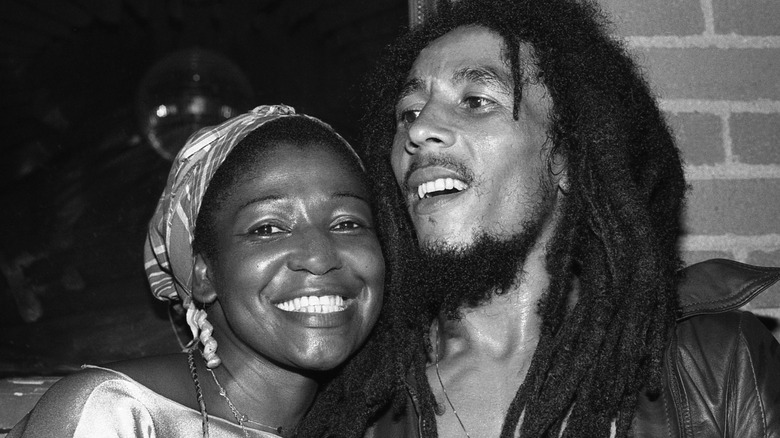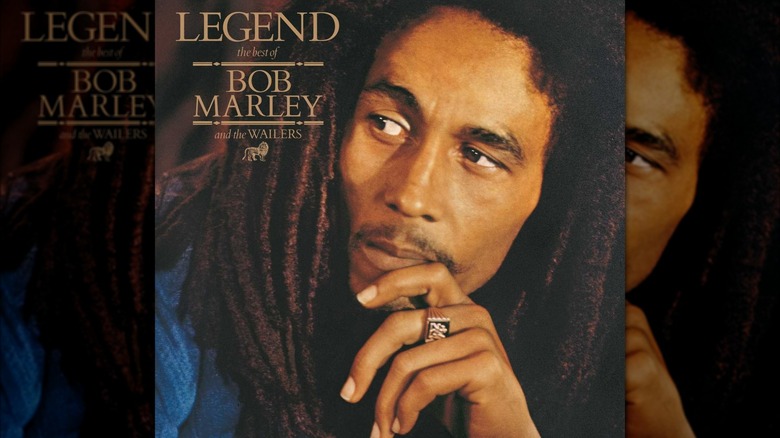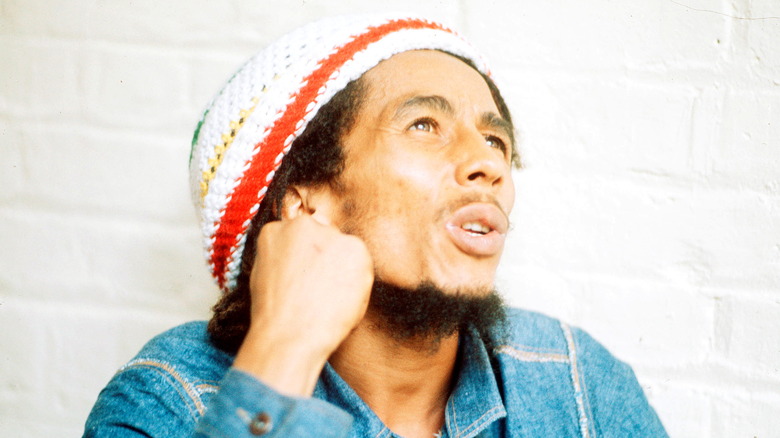False Facts About Bob Marley You Always Thought Were True
We may receive a commission on purchases made from links.
Bob Marley was, as his phenomenally, enduringly popular album claims, a legend. First as a member of the Wailers and then as the group's frontman, he took the sounds of Jamaica to the rest of the world. Music fans everywhere remain entranced by his blend of reggae, rock, and soul, the foundation of dozens of beloved, passionate songs about love, politics, struggle, freedom, and peace, like "Three Little Birds," "Is This Love," "Jamming," "I Shot the Sheriff," "Buffalo Soldier," and so many more.
In part because Marley shot to fame so quickly after his first non-Jamaican-only releases in the 1970s, and because he died just eight years after his rise to worldwide mega-stardom, a lot of misinformation, rumors, and conjecture have developed and spread. Marley was such a compelling, charismatic, and inspirational figure that many stories were invented as a way to get to know the man who was mythical and fascinating in life, and positively mysterious after his death at age 36.
The result: Marley is one of the most extensively covered musicians of the 20th century, and yet so much of what the world knows about him is half true or completely false. Let's bust some myths about the life and work of Bob Marley.
False: His name was Bob Marley
According to common knowledge and a government-issued document, respectively, the globally famous popularizer of reggae is named Bob Marley and he was born on April 6, 1945. Neither of these basic facts about Marley are entirely correct. When Marley was born, his parents christened him Nesta Robert Marley. Nesta, a rare name in Jamaica, was suggested by Marley's father, and it means "messenger." Marley's mother, Cedella, was concerned people would wind up calling her son "Lester," but they mostly ended up using Bob, short for Robert, which came from the child's paternal uncle.
Marley biographers cite his actual date of birth as February 6, but that can't be confirmed. His mother hesitated to register her child's birth for two months because she, a Black woman, feared persecution for carrying on a relationship with Marley's father, a white man. When the birth was finally recorded around two months later, it was listed as April 6; Cedella Marley believed the birth took place right around February 6.
False: Bob Marley was 100% Jamaican
Bob Marley is objectively one of the most important and influential people to hail from Jamaica. Not only a national treasure for spreading uniquely Jamaican music around the world, he was also awarded the Jamaican Order of Merit in 1981, cementing his status as a great Jamaican. While Marley's roots in Jamaica are deep, they don't go back all that far, and the musician himself faced prejudice for the parts of his heritage perceived as not Jamaican enough. Marley's father was Norval Marley, a white man born in England in 1885. He served with the British armed forces in World War I and then worked for the Nigerian military before he moved to Jamaica to work for the U.K.-controlled colonial rulers as a plantation manager. As the mixed-race child of a colonialist, Marley endured some teasing as a child, nicknamed "Little White Boy" by other kids when his hair came in curly.
The musician even spent some time in the United States. In 1966, and just after his 21st birthday, Marley departed Jamaica to work in Wilmington, Delaware. He lived there for a few months initially, and frequently returned for long spells through the late 1970s.
False: He used marijuana a lot
Bob Marley is closely associated with marijuana, appearing in countless photographs (made into T-shirts and posters) enjoying the smokeable substance and admittedly using it and extolling its benefits during his lifetime, particularly in the lyrics of his songs, when it was completely illegal in the United States.
According to one often-told story, Marley smoked as many as 18 joints a day at one point. That's probably not true, because according to his son, Marley's marijuana use was measured, deliberate, and sacred. "My father smoked, but he wasn't a pothead," Ziggy Marley told Rolling Stone. "It correlated to ... spirituality and the Rastafarian faith." Adherents to that belief system, including Marley, use marijuana as a meditative and spiritual aid, with intoxication akin to reaching a different level of consciousness and employed to feel closer to God. "That is something he would better have people understand: the use of the plant and how it correlated with a spiritual aspect of his life, and not just 'oh, let's smoke pot and get high,'" Ziggy added. "Herbs are a special thing. Not frivolous."
False: Island Records discovered Bob Marley
Chris Blackwell, who was born in England but spent large swaths of his youth in Jamaica, started Island Records to distribute the many kinds of Caribbean-originated music he heard in his second homeland. After helping Millie Small's ska song "My Boy Lollipop" become an international hit, and signing the U.K. blues rock band Traffic, Blackwell landed Island's signature act: Bob Marley and the Wailers. The group's "Catch a Fire" was released on Island in 1973, beginning Marley's ascent to international superstardom.
"Catch a Fire" wasn't the first Marley album or even the first Wailers recording. The Wailers originated as a trio, featuring Marley, Peter Tosh, and Bunny Wailer. When the original lineup of the Wailers was still intact, the group released four full-length studio albums, numerous singles, and various other recordings under different names, which made Marley a very well-known figure in Jamaica. Around the time the latter two left and Marley found new musicians, the band signed with Island.
If anybody discovered Marley and brought his music out of Jamaica, it was Johnny Nash. The American soul and reggae singer, best known for his 1972 hit "I Can See Clearly Now," moved to Jamaica in the late 1960s. He witnessed a Wailers performance, decamped to a studio in London, and recorded three Marley-written songs for the "I Can See Clearly Now" album. Nash brought Marley to London, which is where he met Blackwell.
False: He was exclusively a reggae musician
The 1960s and 1970s were a particularly fruitful period in the history of Jamaican music. Different styles, including reggae, ska, and rocksteady, all developed alongside each other, creating some confusion about what, exactly, defined each genre. When Bob Marley's international career took off with the release of "Catch a Fire" in 1973, the word "reggae" was only five years old — coined by the Toots and the Maytals song "Do the Reggay." And while Marley would popularize the genre and earn the nickname "king of reggae" both colloquially and on record, he wasn't strictly a reggae musician. His later recordings combined elements of ska and rocksteady, along with American-style R&B and rock 'n' roll, to create a sound all his own referred to by the umbrella term of reggae. Before his Island Records releases, Marley recorded many songs in the rocksteady style, characterized by African, Caribbean, and jazz influences, as well as ska records, which are uptempo and use horns, as opposed to reggae, which is slower and uses keyboards. Marley's most famous works are fast-paced, like ska, but rely on keyboards, like reggae.
False: Bob Marley was a one-woman man
Bob Marley and Rita Marley, nee Anderson, were friends since they were teenagers, both denizens of the Kingston, Jamaica, music scene. They got married in February 1966. As Bob Marley found fame and fortune with his band, Rita Marley was there, too, as a member of the backing vocal trio the I-Threes. The Marleys remained together until Bob's death in 1981, at which point Rita became an ambassador for her husband's music, legacy, and message, creating the Bob Marley Museum and founding and chairing the Robert Marley Foundation and the Bob Marley Trust, among other endeavors.
Devoted to one another in many ways, the Marleys didn't abide by the traditional notion of marriage in that they didn't remain physically faithful to one another, and openly so. Bob Marley is the confirmed father of 11 children born to seven women, while Rita Marley is the mother of 12. Out of all those offspring, the Marleys had three together — Cedella (born in 1967), David, or Ziggy (born in 1968), and Stephen (born in 1972). Bob formally adopted Sharon, Rita's daughter with another person born before her marriage. Among Bob Marley's children with other women are musicians Julian Marley (he was raised in England by his mother, Lucy Pounder), Damian Marley (born to Cindy Breakespeare, Miss World 1976), and Ky-Mani Marley (son of world-class Jamaican table tennis star Anita Belnavis).
False: He was a lifelong Rastafarian
A central tenet of the Rastafari faith holds that Ethiopian king Haile Selassie was the physical embodiment of God on Earth. The religion took hold in Jamaica in the 1930s, with the idea of a Black messiah appealing and empowering to a population long subjugated by white colonial rule. Born in Jamaica in 1945, Bob Marley grew up around Rastafarianism, but he wasn't raised in the faith in which he'd ultimately become its most famous and prominent adherent. But Rita Marley, the musician's wife, adopted the religion at a young age, and she laid it out for her husband. Around the time that he married her in 1966, 21-year-old Bob Marley took on his wife's religion as his own.
Just before his death, Marley officially added another religion to his belief system. Despondent over the failure of cancer treatments at facilities in New York, Miami, and Mexico, Marley allowed Rita to have him baptized into the Ethiopian Orthodox Church in November 1980. He took on the baptismal name of Berhane Selassie, referencing his devotion to Rastafarianism while also proclaiming his newly adopted Christianity.
False: Legend is his biggest album
In the United States, Bob Marley's best-selling recording, by far, is his 1984 release "Legend." Attributed to Bob Marley and the Wailers, "Legend" has been certified for sales of 15 million copies by the Recording Industry Association of America and spent more than 800 weeks on Billboard's album chart. In the U.K., "Legend" was listed as the 16th-best-selling album in the country's history as of 2019. The track listing boasts one classic after another, including modern standards like "Get Up Stand Up," "No Woman No Cry," "Jamming," and "Stir It Up." Every song feels like a hit, because it is. "Legend" is subtitled "The Best of Bob Marley and the Wailers" — it's a greatest hits album. All of the songs were recorded and released between 1973 and 1980, and so it isn't a studio album representing a single moment in Marley's life or career.
Moreover, "Legend" was compiled by Island Records in 1984, three years after Marley's death, meaning he had no input in terms of song inclusion or sequencing. What guided the creation of "Legend": maximum marketability. The album is full of Marley's songs about peace and love, and scant on his overtly political material, as heard on early LPs such as "Exodus." Island Records employee Dave Robinson told the Phoenix New Times that the songs picked were the ones that would be the best liked by white listeners in the U.S. and Europe. Marley's political songs were deemed too esoteric, unpalatable, and non-commercial.
False: His death was shrouded in mystery and conspiracy
In 1977, a doctor discovered a malignant lesion on Bob Marley's right big toe. According to Marley's doctors, the most effective way to stop the spread of the potentially deadly melanoma — skin cancer — was an amputation of the toe. Marley refused, and, after the cancer moved throughout the musician's body and treatments failed, he died at age 36 in 1981.
Despite a long, well-documented, and ultimately fatal cancer journey, rumors abound regarding Marley's death. Likely giving rise to the idea that Marley was really secretly murdered by the United States' CIA or some other espionage outfit is the fact that he survived a politically motivated assassination attempt in 1976, just five years before his death. The murder theory gained credence in 2017 when a small news outlet called Your News Wire ran an interview with supposed former CIA agent Bill Oxley, who, as he lay dying in a Maine hospital, admitted to carrying out 17 assassinations — Marley among them. According to the myth-busting website Snopes, Your News Wire had a history of running falsified stories. Additionally, it couldn't verify anything present in the confession as factual, including the identity of a CIA agent named Bill Oxley.
False: He had numerous species of bugs living in his hair when he died
Sometime after Bob Marley died at age 36 in 1981, an odd bit of information began to spread about the state of the late musician's personal hygiene. Stated and retold in different ways, it was taken as fact by some that upon Marley's death, a large volume and variety of insects were found in his dreadlocks. For example, Marley's hair was said to have hosted 19 distinct types of lice, or 70 insect species, or a lot of bacteria, or even newly discovered bugs.
The implication is that Marley never washed his dreadlocks, owing to a misconception that the braid-like collections, exotic to many in the '70s and '80s, mustn't be washed. That's not true — dreadlocks can and should be cleaned, and Marley himself told an interviewer that he often washed his. As for the idea that a plethora of tiny living things were discovered in Marley's hair when he died, it's not true because it couldn't be true. Marley died of cancer, despite many chemotherapy treatments. That aggressive regimen left the singer without any of his natural hair, and at his funeral, he wore a wig.
False: He only got popular in the U.S. after his death
Bob Marley and the Wailers' 1984 greatest hits collection "Legend" sold well in the United States after the frontman died in 1981, and it has moved more units than any other Marley album did while the musician was alive. During his lifetime, he was an icon in Jamaica and sold a lot of records in the U.K., while in the U.S., he was more of a cult figure or minor celebrity — neither an unknown quantity nor the superstar he'd become in death. Marley (and the Wailers) reached Billboard's U.S. R&B chart many times while he was alive, with "Roots, Rock, Reggae," "Waiting in Vain," "Wake Up and Live," and "Could You Be Loved" all appearing in the lower rungs. "Exodus" was a bonafide hit, with a No. 19 placement.
Marley's profile benefited from tacit endorsements from some of the biggest mainstream rock stars of the era. Eric Clapton's cover of Marley's "I Shot the Sheriff" went to No. 1 on the pop chart in 1974, a year after Marley wowed fans of Bruce Springsteen when the Wailers opened for the latter in New York in 1973. In a review of the concert for Billboard (via Legendary Reggae), Sam Sutherland gushed that the Wailers were "capable of neatly eclipsing Springsteen's formidable, growing charisma."
False: Bob Marley performed at a different frequency than other musicians
In the summer of 2021, a viral social media meme discussed the inner scientific workings of music. According to the unsourced item, all recorded music produced since 1953 has been tuned to a frequency of 440 Hz. "This frequency has no scientific relationship with our universe and actually causes the brain to become agitated," one version of the meme read, according to Reuters. Because of the effects on the human psyche, music can be used to cause discomfort at 440 Hz, with the Nazis reportedly using such a technique against the Allies in World War II. However, the meme said, a handful of the most famous and exceptional musicians consciously and specifically released their music at a slightly different frequency, of 432 Hz. "It is known as the beat of the earth," the meme attested, and "has substantial healing benefits." Among the beloved musicians who supposedly recorded at this natural, inspirational tone: John Lennon, Jimi Hendrix, Prince, and Bob Marley.
It's all nonsense. "There is no empirical research suggesting that the universe has a preferred acoustic frequency," Berklee College of Music professor Susan Rogers said. "Most listeners' sensibilities are not fine-tuned enough to discern the difference" between frequencies, added Berklee professor Prince Charles Alexander.

